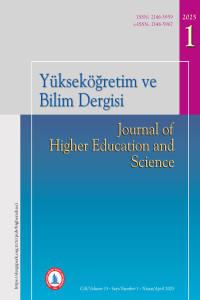Üniversite Öğrencilerinde İlk Yardım Öz Yeterliliğini Geliştirmeye Yönelik Bir Sağlık Eğitimi Müdahalesi: Program Temelli İlk Yardım Eğitimi
Abstract
Bu çalışma, bir üniversitenin sağlık programlarında öğrenim gören ancak ilk yardım dersi almamış öğrencilerine verilen program temelli ilk yardım eğitiminin ilk yardım öz yeterliliği üzerindeki etkisini belirlemek amacıyla yapılmıştır. Bu araştırma ön test, son test ve kontrol grupsuz, yarı deneysel bir çalışmadır. Çalışma, araştırmanın amacı hakkında bilgilendirilen, ilk yardım eğitimine katılan ve Öğrenci Bilgi Formu ile İlk Yardım Öz Yeterlilik Ölçeğini eksiksiz dolduran 210 öğrenci ile yürütülmüştür. Verilerin değerlendirilmesinde Statistical Package for the Social Sciences (SPSS) 25.0 programı kullanılmıştır. Tanımlayıcı veriler frekans, yüzde, aritmetik ortalama, medyan ve standart sapma olarak ifade edilmiştir ve nicel verilerin ön test son test grupların karşılaştırıldığında farklılıklar Wilcoxon test ile incelenmiştir. Öğrencilerin yaş ortalaması 19,43'tür ve %72,4'ü daha önce ilk yardım eğitimi almamıştır. Eğitim öncesi ve sonrası Temel İlk Yardım Öz Yeterlilik Alt Ölçeği (Z=-9.133, p<0.05), Yaşamsal Destek İlk Yardım Öz Yeterlilik Alt Ölçeği (Z=-9.940, p<0.05) ve İlk Yardım Öz Yeterlilik Ölçeği (Z=-9.711, p<0.05) ortanca puanları arasında anlamlı bir fark vardır. Üniversite öğrencilerinin temel ilk yardım eğitimi sonrası puanları eğitim öncesine göre daha yüksektir. Program temelli bir sağlık eğitimi müdahalesi olan ilk yardım eğitimi, üniversite öğrencilerinin ilk yardım öz yeterliliklerini artırmada anlamlı ve etkilidir.
Project Number
YOK.
References
- Altındiş, S., Tok, Ş., Aslan, F.G., Pilavcı Adıgül, M., Ekerbiçer, H.Ç. & Al t ındiş, M. (2017). Assessment of first aid knowledge level of uni versity students. Sakarya Tıp Dergisi, 7(3): 125-30.
- Andsoy, II., Şahin, A.O. &Ural, S. (2014). The efficiency evaluation to f irst aid training given to security personnel in a state university. Journal of Contemporary Medicine, 4(2): 84-90.
- Bakar, C., &Maral, I. (2015). Comparison and contrast of the first aid abilities and information capacities of the apprentices educating in occupational education center and high school. Turkish Journal of Occupational Health and Safety, 10(36): 41-47.
- Bandura A. & Adams N.E. (1977). Analysis of self-efficacy theory of be havioral change. Cognitive Therapy and Research, 1(4):287-310
A Health Education Intervention to Enhance First Aid Self-Efficacy in University Students: A Program-Based First Aid Training
Abstract
This study was conducted to determine the effect of programme-based first aid training on first aid self-efficacy given to students who were studying in a university health programmes but had not taken a first aid course. This study was a quasi-experimental study without pretest, posttest and control group. The study was conducted with 210 students who were informed about the purpose of the study, participated in first aid training and completed the Student Information Form and First Aid Self-Efficacy Scale. Statistical Package for the Social Sciences (SPSS) 25.0 program was used to evaluate the data. Descriptive data were expressed as frequency, percentage, arithmetic mean, median, and standard deviation, and the differences between the pre-test and post-test groups of quantitative data were analyzed by Wilcoxon test. The mean age of the students was 19.43 years, and 72.4% of them had not received first aid training before. There is a significant difference between the median scores of Basic First Aid Self-Efficacy Subscale (Z=-9.133, p<0.05), Vital Support First Aid Self-Efficacy Subscale (Z=-9.940, p<0.05) and First Aid Self-Efficacy Scale (Z=-9.711, p<0.05) before and after the training. The scores of university students after basic first aid training are higher than before training. First aid training, a programme-based health education intervention, is meaningful and effective in increasing the first aid self-efficacy of university students.
Project Number
YOK.
References
- Altındiş, S., Tok, Ş., Aslan, F.G., Pilavcı Adıgül, M., Ekerbiçer, H.Ç. & Al t ındiş, M. (2017). Assessment of first aid knowledge level of uni versity students. Sakarya Tıp Dergisi, 7(3): 125-30.
- Andsoy, II., Şahin, A.O. &Ural, S. (2014). The efficiency evaluation to f irst aid training given to security personnel in a state university. Journal of Contemporary Medicine, 4(2): 84-90.
- Bakar, C., &Maral, I. (2015). Comparison and contrast of the first aid abilities and information capacities of the apprentices educating in occupational education center and high school. Turkish Journal of Occupational Health and Safety, 10(36): 41-47.
- Bandura A. & Adams N.E. (1977). Analysis of self-efficacy theory of be havioral change. Cognitive Therapy and Research, 1(4):287-310
Details
| Primary Language | English |
|---|---|
| Subjects | Higher Education Studies (Other), Health and Community Services |
| Journal Section | Research Article |
| Authors | |
| Project Number | YOK. |
| Publication Date | April 30, 2025 |
| Submission Date | April 4, 2024 |
| Acceptance Date | March 26, 2025 |
| Published in Issue | Year 2025 Volume: 15 Issue: 1 |


